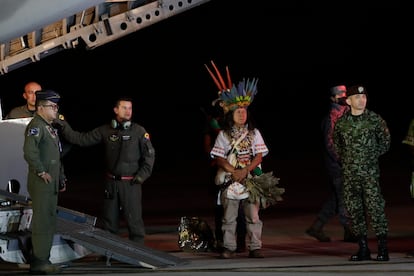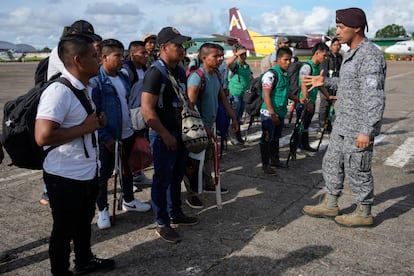Operation Hope: The alliance between the military and indigenous groups to find Colombia’s missing children
While local communities brought their knowledge of the Amazon jungle to the search, the military contributed technology, food kits that they dropped from aircraft and a variety of techniques to help locate the minors

The search is over. “The indigenous communities that were conducting the search and the military forces, jointly, found the children 40 days later,” said Colombian president Gustavo Petro as he celebrated the discovery of the four young siblings — ages 13, 9, 4, and 11 months — who survived a small plane crash on May 1 and wandered in the Amazon jungle by themselves for 40 days. The feat seems impossible considering the difficulty of surviving in humid terrain filled with jaguars, snakes and poisonous plants. ‘Operation Hope’ was the name of the government’s mission to find them.
The key lies in the cooperation between the armed forces and indigenous groups from the Siona and Araracuara areas of the Amazon jungle, the president said. Local indigenous communities “obviously know much more about the jungle than we do,“ and the joint operation, said Petro, is “an example of what this type of alliance can do for the country.”
Pedro Sánchez, commander of the special forces, recently explained that 184 people had been “combing” the jungle every day: 112 soldiers and 72 indigenous people.

“They understand the jungle better, they know how to interpret the tracks very well. One of them found the plane,” Sánchez told EL PAÍS about his indigenous teammates. The site of the crash is where they found the bodies of three adults, including the children’s mother, but no sign of the kids. That was when they thought that they might still be alive.
While the indigenous volunteers brought their knowledge of the Amazon to the search, the military contributed technology and a variety of strategies: they hung whistles on pieces of duct tape so that the children could make noise if they found them; they lit up the sky with headlights to attract their attention; they used loudspeakers to play recordings of their grandmother’s voice, speaking in the Uitoto language, in which she asked the little ones to stay in one spot so rescuers could find them.
“From the air, with two Black Hawks and nine more aircraft, we launched 10,000 flyers in the indigenous language and food kits,” added Sánchez. Rescuers also used a dog named Wilson, who helped find clues to the children’s whereabouts but ultimately got lost in the depths of the jungle and has yet to be found.
“Our gratitude to the Creating Father, the indigenous brothers, the military forces and the organizations that supported the search,” the Organization of Indigenous Peoples of the Colombian Amazon (OPIAC) published on its social media. “The survival of the children is an example of the knowledge and relationship with the natural environment of life, which is taught from the mother’s womb.”
A small footprint, a baby bottle and little else were the clues that the search teams had to work with, and which allowed them to maintain hope. There were times when they believe they must have had been only 200 or 300 meters from the siblings, but in the dense jungle they were unable to see them. The Minister of Defense, Iván Velásquez, said that they noticed the food they dropped from the air was being consumed, and the indigenous groups said that, due to the signs on the leftovers, it must be the children eating the food and not animals that found it. “That oriented us in a certain direction: the minors had almost gone full circle,” said the minister.
On May 1, the day the four of them survived a small plane crash, their mother Magdalena Mucutuy died along with the pilot and a third adult. Since that day, their father Manuel Ranoque, who is governor of the Puerto Sábalo indigenous community, had also been looking for them in the jungle. Ranoque had left their homeland before the rest of the family because of threats to his life made by an armed group. The family was trying to meet again and relocate to a new city, far from the bullets. An accident cut short that dream. After 40 days of uncertainty, Manuel Ranoque will at least now be able to reunite with his children.
Sign up for our weekly newsletter to get more English-language news coverage from EL PAÍS USA Edition
Tu suscripción se está usando en otro dispositivo
¿Quieres añadir otro usuario a tu suscripción?
Si continúas leyendo en este dispositivo, no se podrá leer en el otro.
FlechaTu suscripción se está usando en otro dispositivo y solo puedes acceder a EL PAÍS desde un dispositivo a la vez.
Si quieres compartir tu cuenta, cambia tu suscripción a la modalidad Premium, así podrás añadir otro usuario. Cada uno accederá con su propia cuenta de email, lo que os permitirá personalizar vuestra experiencia en EL PAÍS.
¿Tienes una suscripción de empresa? Accede aquí para contratar más cuentas.
En el caso de no saber quién está usando tu cuenta, te recomendamos cambiar tu contraseña aquí.
Si decides continuar compartiendo tu cuenta, este mensaje se mostrará en tu dispositivo y en el de la otra persona que está usando tu cuenta de forma indefinida, afectando a tu experiencia de lectura. Puedes consultar aquí los términos y condiciones de la suscripción digital.









































